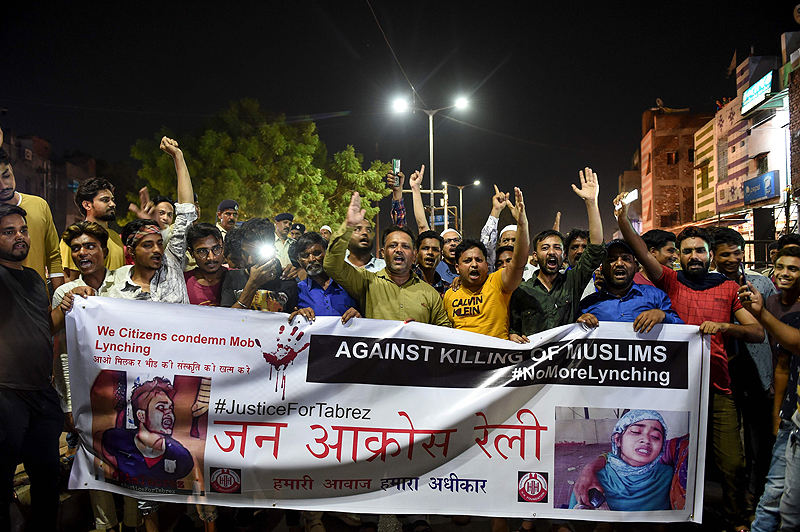
NEW DELHI: Indian Prime Minister Narendra Modi said yesterday he was “pained” by the killing last week of a Muslim man who was tortured and forced to chant Hindu slogans, the latest example of rising communal violence in the secular country. Modi has faced criticism for not speaking strongly enough against Hindu vigilantes targeting Muslims and other minorities, but called Wednesday for strong action against those guilty of the brutal attack.

“The lynching in Jharkhand has pained me. Everyone… is grieved at the loss of life of the youth, and the guilty should be given harsh punishment,” he said in the upper house of parliament. Police in Jharkhand have so far arrested 11 men in connection with the attack - including the main accused, who was seen thrashing Tabrez Ansari in a video that went viral on social media. Ansari, 24, had been accused by villagers of burglary. He was tied to a pole and beaten for up to 12 hours before police first detained him. They took him to hospital, where he died Saturday.
Indian opposition parties accuse Modi of not doing enough to stop communal attacks that have increased since his nationalist Hindu Bharatiya Janata Party took power in 2014. The party was re-elected with a resounding majority last month. Modi said also he was saddened by the deaths from Acute Encephalitis Syndrome of over 150 children in eastern Bihar state. “We have pressed resources to fight the encephalitis epidemic and we have to fight this together,” he said of the virus, which scientists say could be spread from a toxin found in ripening lychee fruit.
Meanwhile, US Secretary of State Mike Pompeo hailed yesterday Modi’s “wonderful” re-election, vowing both sides will overcome a number of spats that have dogged relations under President Donald Trump. “I am confident that we have the benefit of building on a strong foundation between two of the world’s great democracies. We saw this in the election, we saw this incredible democratic vigor lead to a wonderful outcome,” Pompeo said after meeting Modi in New Delhi.
As a democratic heavyweight in a region dominated by authoritarian China, India is a natural US bedfellow but Trump has irked New Delhi with measures aimed at reducing the trade imbalance under his “America First” mantra. Washington in turn is unhappy at what it sees as India’s well-developed protectionism, often expressed through tariffs and red tape that makes life difficult for US firms competing in the huge market of more than a billion consumers.
With Trump calling India the “tariff king”, Washington has refused to exempt India from higher steel and aluminium tariffs and has ended India’s preferential trade status that allowed the Asian giant to send America $6 billion in goods duty-free every year. India retaliated earlier this month with tariffs on 28 items imported from the US, including almonds, apples and walnuts - products close to the hearts of voters in Trump’s rural base.
G20 groundwork
But Pompeo - preparing the groundwork for talks between Modi and Trump at the G20 in Japan later this week, when the president’s myriad trade battles will loom large - suggested relations could be fixed. “There are tariffs and counter-tariffs and we said we’re going to do our best to make sure that all the right people get in all the right places and work through these problems, so that we can get out of this and get on with the business of growing each of our two economies,” Pompeo told a news conference.
This was echoed by Indian Foreign Minister S Jaishankar, who said he was “optimistic about where our economic relationship is going”. But he appeared to stick to India’s guns that it intended to buy the S-400 missile defense system for $5.2 billion from Russia despite the threat of US sanctions slapped on countries buying Moscow-made military kit.
Russia has long been a major arms supplier to India, but New Delhi’s use of its hardware complicates US efforts to bolster regional security cooperation to counter China, as well as its push to pressure the Kremlin. “I think Secretary Pompeo knows, and I have explained to him in some detail, we have many relationships with many countries… We will do what is in our national interest,” Jaishankar said. He also said Pompeo was “receptive” to Indian worries that any US-Iran conflict might interrupt the flow of oil from the Middle East and endanger the large Indian diaspora there.
Pompeo “understands that this is today the world’s fifth-largest economy, which imports 85 percent of its energy, a large part of it from the Gulf… He gets what our interests are,” Jaishankar said. “We all know that we need to keep that waterway open,” Pompeo said, referring to the Strait of Hormuz. “And we also know that Iran is the world’s largest state sponsor of terror. We know how the Indian people have suffered from terror around the world.” – Agencies









